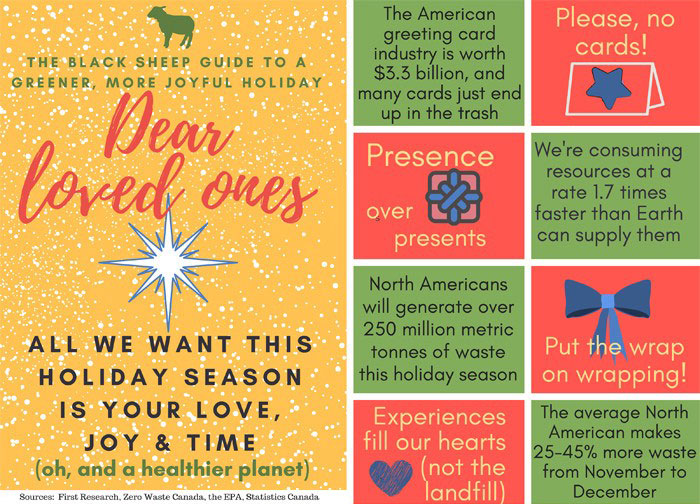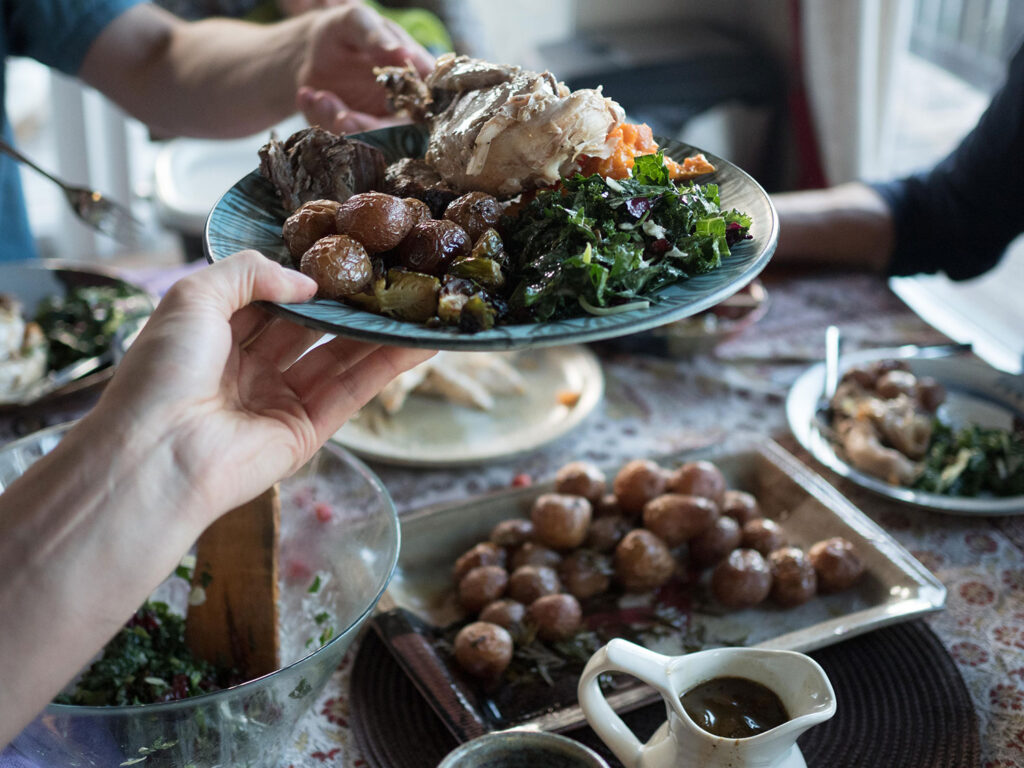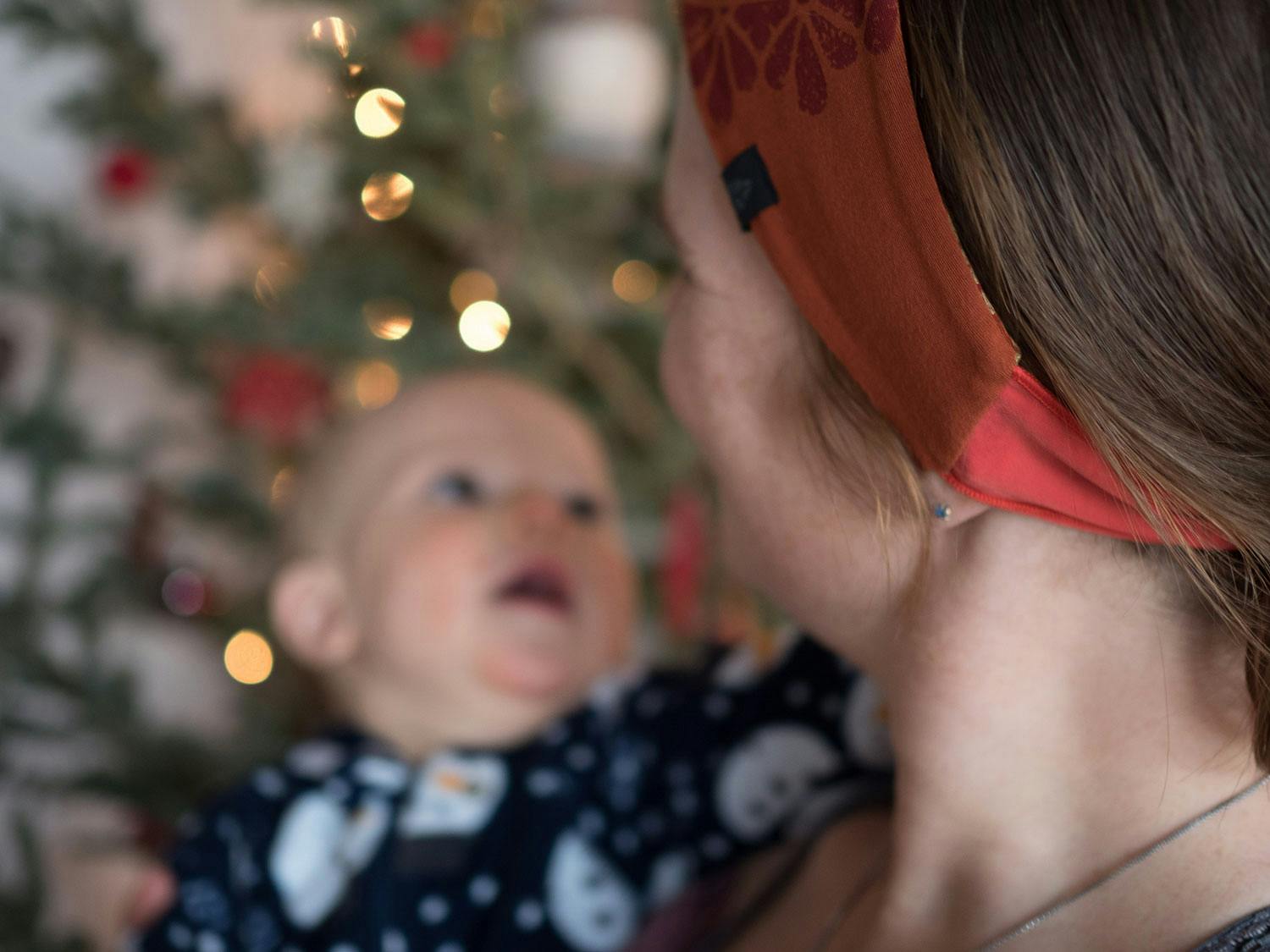The Black Sheep Parent’s Guide to Greener, More Joyful Holidays
This holiday season, find ways to show you care for the planet as well as your loved ones.
When we have more than we need, we can lose track of the most important things: the ones we love, and the planet that supports us.
First, a confession: I love, love, LOVE the December holiday season. The thought of walking through twinkly fairy lights, sharing old traditions, making new ones, smiling at strangers on the street, and basking in family time makes me want to do festive cartwheels in the snow.
Since becoming a full-time grown-up, however, I’m finding more and more to make me cringe during the holidays: looking at the bags of waste on Christmas morning, gorging on treats until our tummies hurt, unwrapping a gluttony of gifts, listening to my preschooler whine for “just one more” of something, anything. When the presents and meals are done, a weird feeling of emptiness creeps in, right when we should be feeling more full of love than ever before.
When we have more than we need, we can also lose track of the most important things: the ones we love, and the planet that supports us. Like many others, I’m still re-calibrating after the most recent IPCC report, so I’ll share a few facts that are decidedly not too merry:
- Canadians will generate 540,000 metric tonnes of trash this holiday season, made up of tape, foil, gift wrap, bags, and cards, says Zero Waste Canada. To put that number in context, there are only 37 million of us here, and this is 25% more than any other time of year.
- According to Global Footprint Network, our consumption has now reached the point that we use resources at a rate 1.7 times faster than the Earth can regenerate them.
We still love magic, beauty, and tradition. So how do we keep all that without giving in to the constant craving of the holidays?
- When it comes to recycling, the wool is finally being pulled from our eyes (sheep pun utterly intended); until the beginning of this year, China bought approximately two thirds of North America’s recyclable materials. Since it closed its borders to much of the world’s recycling, we’re left with more material than we can manage. We need to find ways of living that don’t depend on sending our excess to either the landfill or the recycling depot.
- I tried really hard to find authoritative statistics about greeting card waste, but couldn’t pin down numbers I felt confident about. The sources I did find cited North American sales in the billions each year. So whatever the real number is, we can assume it’s alarming.
Mini Ewe and Little Grey are already going to be those kids who know well before the others (i.e. now) that Santa Claus is just a fun story, but I’m not the Grinch. We still love magic, beauty, and tradition. So how do we keep all that without giving in to the constant craving of the holidays?

Zero-waste holiday
“Zero waste” is both a set of principles and a lifestyle that emphasizes producing as little landfill-bound waste as possible. But this doesn’t mean just diverting stuff to recycling; as the Zero Waste hierarchy indicates, recycling is far from being the best option.
This anti-materialistic philosophy prioritizes a mindset of “refusing”; this means saying no to any materials, packaging, or items that aren’t absolutely necessary. Bea Johnson — called the “Priestess of waste-free living” by the New York Times — doesn’t own a trash can, has a million uses for Mason jars, and makes her own stationery. Each of her family members can fit their entire wardrobe in a carry-on, and she tells guests to bring their garbage home with them if they happen to show up with a casserole covered in foil. This way of living might sound extreme, but so do those statistics I mentioned earlier.
Though we aren’t embracing a 100% zero-waste holiday, we’re still aiming for the following:
- When wrapping the few gifts that still make it under the tree, we’ll be getting creative with packaging: scarves, pillow cases, tablecloths are all fair game. If you happen to be buying our kids something and want to do the same, I promise to give you your “wrapping” back afterwards.
- The world doesn’t need more cards! But if a card does seem important, last year’s cards make excellent materials for making this year’s.
- Food waste is weighing on my mind these days. The Natural Resources Defense Council reports that up to 40% of food is wasted in the US, and the percentage from festive meals is surely higher. I know the holidays are all about sparkly spontaneity, leading some to wildly throw all the fun into their grocery cart. But I’ll be the boring one making a menu plan in her car before entering the store, because this helps reduce so much food waste in our home.

I’ll be making a menu plan so none of this year’s feast is added to society’s massive food waste problem.
Mindful gift-giving
Sometimes zero-waste gurus seem to assume people have everything they need, and just need to refuse the “extras”; considering 4 million Canadians still experience food insecurity, and 1 in 8 Americans do, this is obviously far from the case. I’m so grateful that we’ve never had to choose between putting food on the table or a gift under the tree. But we’re a young family on a tight budget, and still acquiring the things to make our family run smoothly.
Mini Ewe and Little Grey seem to genuinely need something new every two weeks, whether it’s socks for their ever-growing feet, or long johns for our ever-evolving adventures. We’re also still trying to curate our ideal toy collection based on some minimalistic principles, even though currently our living room looks more like the Island of Misfit Toys. Christmas is a time that we allow ourselves to collect some of these things.
So this year, we’ll try out the “four gift Christmas” — hopefully this will help us find the right balance of gift-giving and shared holiday experiences. Eric and I will give Grey and Mini Ewe one gift from each of the following categories:
- Something they want: We’ll look for quality stuff that maximizes creative, interactive, and open-ended play, and that still brings them joy on Christmas morning.
- Something they need: We will be intentional about this, planning what the biggest need is for each kid that they’ll still enjoy finding on Christmas morning.
- Something to wear: Here we’ll privilege sustainable fabrics and processes, as well as second-hand finds.
- Something to read: If we were to ever embrace a fully waste-free life, we would still choose paper books over screens.
Eric and I will each give each other one gift from within those categories. The grandparents get to choose two gifts from the categories for each grandkid. If these gifts are non-material, second-hand, sustainable, or hand-made, even better. (I know the grandmas and grandpas are reading this right now: Sorry/Thank you/We love you!). So although there will be some material items under the tree, we’re hoping for a holiday that allows us to focus more on our time together, not on stuff (or figuring out what to do with all the stuff).
My flock is also going to be taking some time to up our experiential (i.e. not stuff) gift-giving game. I’m taking some time over the next couple of weeks to snoop around the internet and talk to people, as I figure out what makes the difference between a good experiential gift and an awesome one. So watch out, because I’ll be baaaaa-ck next month to tell you what I found (two sheep puns is enough for one article, yes?).
Activist and writer George Monbiot put it best in his excellent essay “The Gift of Death”:
Bake them a cake, write them a poem, give them a kiss, tell them a joke, but for god’s sake stop trashing the planet to tell someone you care. All it shows is that you don’t.
Ultimately, each family will figure out its own “stuff-to-no-stuff” ratio, and it’s alright if the process of disentangling the holidays from consumerism takes a few years — it absolutely will for us. Meanwhile, we’ll remember that even a Mason jar can’t hold the most important things: love, time, gratitude, and joy.
